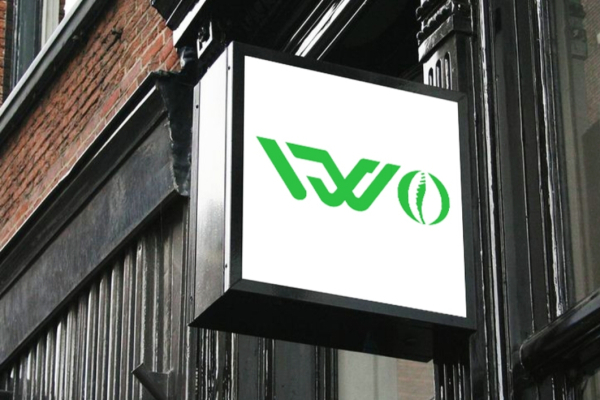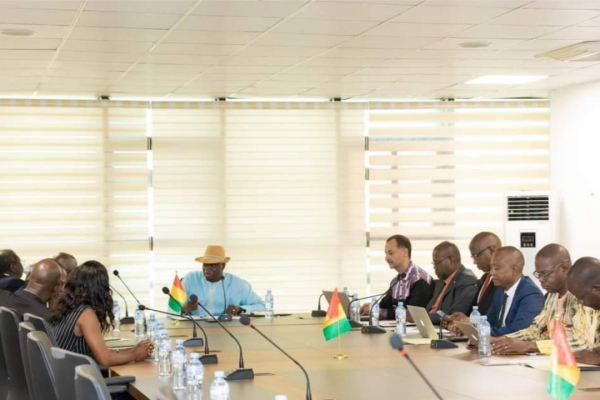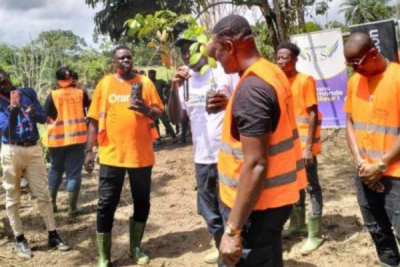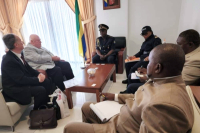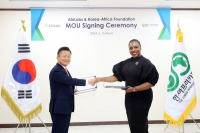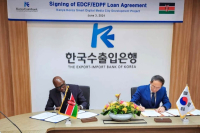Compliant with West African accounting standards, this online accounting solution is accessible in 17 African countries. It simplifies account management for small and medium-sized enterprises, independent entrepreneurs, and accounting firms.
Iwo is a fintech solution developed by a Beninese startup, enabling businesses to manage their accounting online from a computer or smartphone. The startup, based in Cotonou, was founded in 2020 by Razak Hachimou.
"Iwo enables the production of financial statements in compliance with standards in just one click and easy account management. Its team also offers expert support,” explains the startup. It adds : “Iwo prevents data loss in case of PC, tablet, or phone losses. You can access your data anytime, anywhere, thanks to the Internet."
Since the startup does not have a mobile app, users access its services through its website. To try Iwo for free, they need to click on the button "Try for Free" and create their accounts with personal details such as first name, last name, email address, and phone number, as well as professional information like the company name and physical address.
After completing this step, they can access the many features of Iwo for free for 14 days to evaluate the solution. "The flagship feature of Iwo is the cash register, which simplifies accounting for entrepreneurs or business managers who do not have accounting skills or the means to hire an accountant or accounting firm. The cash register facilitates bookkeeping without debit-credit maneuvers," the startup explains.
In addition to the cash register, Iwo offers functionalities like the chart of accounts, general ledger, financial statements, projects, and transactions. After the trial period, users need to choose one of the subscription plans to continue using its features. The said plans are priced at XOF3,000 (about $5) for the Envol plan, XOF3,500 for the Mature plan, and XOF5,000 for the Expertise plan monthly.
Adoni Conrad Quenum
In 2022, only 34% of the population in West and Central Africa had access to broadband connectivity, according to the World Bank. To improve this situation, regional initiatives are underway to increase connectivity rates in these regions.
The deployment of the Amilcar Cabral submarine telecommunications cable, aimed at connecting Cape Verde, Gambia, Guinea, Guinea-Bissau, Liberia, and Sierra Leone, is gradually taking shape. A delegation from the Economic Community of West African States (ECOWAS), led by Mr. Sediko Douka, Commissioner for Infrastructure, Energy, and Digitalization, met with Mr. Nouha Traoré, Secretary General of the Ministry of Posts, Telecommunications, and the Digital Economy of Guinea, on Monday, June 3, to discuss the development of this strategic project.
"The discussions focused on several key aspects of the project, including its regional significance and importance for ECOWAS integration, the technical milestones to be implemented, obtaining the necessary permits for cable deployment, and the financial aspects of the project," said the Guinean Ministry of Digital Economy in a press release.
The meeting occurred more than a year after the signing of a memorandum of understanding with the ECOWAS Commission for the project's development. Under this partnership, the six countries involved committed to participating in the evaluation of the project's technical, economic, financial, social, and environmental feasibility, as well as mobilizing the necessary resources for its implementation. The ECOWAS Commission will coordinate the project's execution by interacting with the beneficiary countries, donors, and other stakeholders.
Guinea and Gambia, through the West Africa Regional Digital Integration Program (WARDIP), have secured funding from the World Bank for the implementation of the crucial project estimated to cost over $90 million.
Once completed, the Amilcar Cabral submarine cable is expected to enhance international telecommunications capacity, improve access to digital services, and provide essential redundancy to ensure the resilience of high-speed Internet in the affected countries. The cable is also expected to improve the digital infrastructure necessary to attract foreign investment, create jobs, and support the development of the digital economy in the region.
After Asia and Europe, with expansions into the United Kingdom, Georgia, and Turkey, the Emirati startup OneClickDrive has decided to invest in a new continent. The company has chosen Morocco as the starting point for its African venture.
OneClickDrive, an Emirati car rental marketplace, is expanding its operations to Morocco, marking its first foray into the African market, a release dated June 3rd announces.
Based in Dubai, the startup is supporting its growth by investing in another continent after Europe and Asia. For its debut in the Moroccan market, it has launched services in eight cities: Agadir, Casablanca, Fez, Marrakech, Nador, Oujda, Rabat, and Tangier. Founded in 2015 by Mahesh Pagarani, OneClickDrive specializes in car rentals and leasing across a range of vehicles, from low-cost options to luxury cars.
In addition to its web platform, OneClickDrive offers a mobile app available on iOS and Android, which has already been downloaded more than 50,000 times according to Play Store data. After creating an account, users can access the start-up's fleet of over 5,000 vehicles.
OneClickDrive has partnered with more than 250 car rental providers in the cities where it operates to ensure its 100,000 monthly customers can find the right vehicle for their needs. It’s worth noting that African start-ups operating in the mobility segment raised $48 million in equity capital across 17 deals, according to data from the tech-focused investment fund Partech Africa.
Adoni Conrad Quenum
Africa, rich in natural resources and biodiversity, faces numerous major environmental challenges. Orange and its employees are committed to helping reduce these threats through various initiatives.
On Wednesday, June 5, Orange Middle East and Africa unveiled the Engage for Change program in collaboration with its employees to reinforce their ongoing commitment to corporate social responsibility (CSR). The program aims to positively impact society and the environment while enhancing team cohesion.
"This platform is a powerful tool for uniting our teams around shared values. Every initiative, every action taken by our employees demonstrates our collective ability to bring about significant change. We’re proud to see this commitment come to fruition and to witness the positive impact it generates," said Asma Ennaifer, Executive Director of CSR and Communication at Orange Middle East and Africa.
Through the interactive platform engageforchange.orange.com, employees are actively encouraged to participate in social and environmental initiatives that have a concrete and positive impact on our communities. These initiatives include local projects, partnerships, and eco-responsible actions. Encouraged actions encompass reducing carbon footprints, supporting local communities, promoting education and health, and engaging in sustainable projects.
Throughout the day on June 5, and across the region, several local initiatives were organized to demonstrate the tangible impact of the platform. In Mali, for example, a team of 200 Orange employee volunteers participated in the reforestation of an urban park dedicated to children by planting 1,000 trees, contributing to the fight against desertification and creating green spaces for the youth.
Additionally, other notable initiatives include awareness campaigns on the importance of recycling and electronic waste management, training workshops for young people on digital skills, and partnerships with local NGOs to support vulnerable populations. These collective efforts reflect Orange Middle East and Africa's commitment to playing an active and responsible role in sustainable development and the well-being of the communities it serves.
Samira Njoya
The growth of e-commerce on the continent is driving an increase in demand for logistics services, including last-mile delivery. To fill this gap in his country, a tech entrepreneur a tailored solution.
Moroccan startup Forcelog allows users, particularly e-commerce merchants and business professionals, to deliver orders or packages to their customers. The start-up, based in Casablanca, was founded in 2021 by Anas Bouziane.
Currently, there is no mobile app for its eponymous solution but, users can access its services through its website. To start the process, they need to sign up as a client by clicking on the button "Become a client" button and filling a form with with their name, company name, email address, the city where their company's headquarters are located, etc. After this step, they gain access to a workspace to manage their activities with Forcelog.
"Our services include free pickup from your store or storage facility without a minimum quantity, storage in our facilities until orders are triggered by your customers, product preparation and packaging if necessary, and finally the shipping and delivery of parcels to the customer's address," explains the startup.
Forcelog claims to deliver to 240 destinations within Morocco. The startup offers 24-hour delivery times for major cities like Casablanca, Rabat, and Marrakech, and two-day delivery for smaller towns. Users can track the progress of deliveries in real-time from their workspace through the tracking system. Prices start at 18 Moroccan dirhams (about $1.81) per delivered order.
Adoni Conrad Quenum
The development of a Central Bank Digital Currency (CBDC) holds significant importance for African development on several fronts as it can serve as as a catalyst for financial inclusion, allowing unbanked populations to access formal financial services. This, in turn, can spur economic growth by empowering individuals and small businesses with access to credit and other financial tools.
The National Bank of Rwanda (BNR) intends to launch a Central Bank Digital Currency (CBDC) to enhance financial inclusion and provide a secure alternative to cash, Deputy Governor Soraya Hakuziyaremye disclosed in a June 3 interview with The New Times Rwanda.
According to Hon. Hakuziyaremye, BNR worked with the Ministry of Finance and the Ministry of ICT and Innovation on a feasibility study to prepare for the launch of the CBDC. The digital currency is expected to promote innovation, improve cross-border payments, and support Rwanda's cashless policy.
The BNR plans to involve banks and consult the public to gather feedback and address concerns about financial system stability, data privacy, and system resilience. The public consultation, open until the end of June, will inform the next step in the CBDC development, which is the proof of concept.
According to the World Bank's Global Findex 2021, 71% of adults in developing economies now have a formal financial account, a significant increase from 42% a decade ago when the database was first published. Additionally, the proportion of adults making or receiving digital payments in these economies rose from 35% in 2014 to 57% in 2021. The significant increase in digital payment adoption in developing economies underscores the potential impact of Rwanda's planned digital currency. The introduction of a digital franc could leverage this momentum to further enhance financial inclusion and efficiency in payments, aligning with broader regional and global digital transformation goals.
Hikmatu Bilali
Nigeria’s Co-Creation Hub (CcHub) has launched “Let’s Build, Africa,” a program aimed at helping African startups expand across the continent. The initiative provides startups with strategic insights and resources to enter new markets.
Eligible startups must be registered in Africa, have an African founder, and be at the scale-up stage. Benefits include pitching to investors, travel and ecosystem tours, six months of post-tour support, and product showcases.
The application deadline is June 30, 2024, with program activities running from July 2024 to April 2025.
Africa is experiencing a rapid surge in mobile usage. This growth brings several mobile security challenges that threaten both users and businesses.
Gabon's Ministry of Digital Economy and New Information Technologies announced a key partnership with Turkish group iF Elektronik Ltd. on Monday, June 3rd. The agreement, reached after extensive negotiations, paves the way for the implementation of the Central Equipment Identity Register (EIR) technology in Gabon.
The project includes enhancing the security of mobile devices such as phones and establishing a competency center. It aims to increase government revenue through additional taxes, combat phone theft and cloning by reducing the illegal market, create 30 jobs for Gabonese engineers with skill transfer at the project's inception, and eliminate smuggling and counterfeiting of mobile equipment.
The EIR will be fully funded by iF Elektronik Ltd., with no cost to the Gabonese government. It is expected to generate $38 million annually, with $26 million in tax revenue and $12 million in service fees. This initiative aligns with the Gabonese government's goal of promoting the development of the digital economy and strengthening the security of electronic communications.
The project's implementation is scheduled to begin within three months of signing the memorandum of understanding. This strategic partnership will enable Gabon to enhance the security of electronic communications, protect users from fraud and theft, improve the quality of telecommunications services, and offer a better user experience while stimulating innovation and economic growth in the information and communication technology sector.
Samira Njoya
African startups are critical drivers of economic and social progress across the continent. To unlock their full potential, they need a supportive environment, including access to funding, mentorship, and the resources they need to thrive.
AfriLabs, a pan-African network of technology innovation hubs, announced on Tuesday, June 4, a memorandum of understanding with the Korea-Africa Foundation (KAF), an initiative of the Korean government aimed at supporting partnerships with the African continent. This partnership aims to promote innovation and economic prosperity across Africa by supporting startups.
"At AfriLabs, we're dedicated to unlocking Africa's full potential and generating wealth through strategic alliances. This partnership unlocks a treasure trove of opportunities for startups, granting them access to a global network, invaluable resources, and unparalleled industry knowledge," AfriLabs stated on X.
As part of the partnership, AfriLabs and KAF will implement projects leveraging their respective expertise to foster a dynamic ecosystem that cultivates talent and promotes a strong entrepreneurial spirit. The goal is to empower the next generation of African innovators and entrepreneurs to build sustainable development.
The partnership comes on the eve of the Korea-Africa Young Startup Forum, which will be held today Wednesday, June 5, in Seoul. This event aims to strengthen cooperation between Korea and African nations by bringing together investors, startups, and support organizations from both continents.
The partnership is expected to enable startups within the AfriLabs network to benefit from Korea's digital experience. The country boasts an ultra-advanced technological environment that can serve as a model for African entrepreneurs. By combining their strengths, AfriLabs and KAF are confident that this partnership will significantly contribute to transforming Africa into a prosperous and innovative continent.
Samira Njoya
In a bid to establish Kenya as a leading tech hub in Africa, Kenyan authorities are forging multiple partnerships with various stakeholders from the United States, China, and South Korea.
Kenya has secured $238 million from Korea Eximbank to invest in the Konza Technopolis smart city. The agreement was finalized on the sidelines of the Korea-Africa Summit 2024, held on Tuesday, June 4, and Wednesday, June 5, in Ilsan and Seoul, South Korea.
"The government of Kenya and Korea Exim Bank, represented by Executive Director and Board Member H.E. Hwang Kiyeon, signed two funding agreements amounting to US$ 238M for the financing of Konza Digital Media City project to establish a cutting edge film and creative economy hub at Konza Technopolis," stated Korir Sing'Oei [photo, left], Kenya's Minister of Foreign Affairs.
Previously known as Konza Technology City, Konza Technopolis was launched by the Kenyan government in 2012. It is part of the Kenya Vision 2030 national development plan, which aims, among other goals, to position the country as a technological leader in Africa. Supported by the World Bank through the International Finance Corporation, this smart city project includes advanced ICT infrastructure, innovation centers, and digital training programs.
Upon taking office in 2022, President William Ruto sought to revitalize the Konza Technopolis project. "The administration will strengthen Konza Technopolis to bring together industry, academic institutions and other innovators to co-invest in emerging technologies to create high-quality jobs that leverage on artificial intelligence, robotics and other technologies and thus enhance our regional and global competitiveness," he said in 2022.
Adoni Conrad Quenum
More...
A computer science graduate, she actively helps young people create innovative technological solutions. She has received numerous awards and honors for her positive impact on Africa.
Clarisse Iribagiza (photo) is a Rwandan computer scientist and the co-founder of DeepTechAfrica, a venture studio and investment fund.
Established in 2022, DeepTechAfrica was founded in collaboration with the Massachusetts Institute of Technology’s Legatum Center for Entrepreneurship and Development. It aims to develop inclusive and sustainable ecosystems focused on innovation. The organization focuses on the commercialization of research, provides consulting services, and offers educational programs. It primarily invests in deep tech startups in Africa.
Clarisse Iribagiza also serves on the board of the Allan and Gill Gray Philanthropy in East Africa, which supports the entrepreneurial ecosystem through grants and the incubation of targeted social enterprises. She is also a board member of the Africa Climate Foundation, an African strategic organization focusing on climate change and development. Additionally, she is part of the African Development Bank's Presidential Youth Advisory Group.
Before launching DeepTechAfrica, Clarisse Iribagiza founded the startup HeHe in 2010. HeHe leverages technology to create an efficient logistics service, connecting manufacturers, distributors, retailers, and end consumers, while providing access to a variety of on-demand goods and services.
She graduated from the College of Science and Technology at the University of Rwanda, earning a Bachelor's degree in Computer Engineering in 2011. She also holds a Master's degree in Organizational Leadership from the African Leadership University’s School of Business, obtained in 2018.
Her influence and achievements have been widely recognized. She was named among Africa’s 20 most influential people at the continent’s business leaders summit in 2012. In 2013, she received the "Celebrating Young Rwandan Achievers" (CYRWA) award from the Imbuto Foundation. In 2015, Forbes named her among the most promising young African entrepreneurs under 30.
Melchior Koba
Digital inclusion is essential for achieving sustainable development goals and ensuring a prosperous future. In this context, Lesotho, in collaboration with international partners, is rolling out initiatives to bridge the digital divide.
The United Nations Development Programme (UNDP) and Lesotho's Ministry of Information, Communications, Science, Technology, and Innovation (MICSTI) have joined forces to launch a groundbreaking model for e-government service points. This initiative aims to accelerate digital transformation and enhance access to public services through digital channels.
The program empowers micro, small, and medium enterprises (MSMEs) to offer essential digital services within their communities. This approach addresses the digital divide, promoting greater digital inclusion across Lesotho. Developed by the UNDP Accelerator Lab as a pilot project, the model aligns with UNDP's broader strategy to expand digital access nationwide.
By establishing e-government service points, rural and remote communities will gain the ability to access vital government services like administrative transactions, digital payments, and information services. This eliminates the need for long journeys to traditional service providers, often located in distant areas.
This significant step forward aligns with the government's commitment to provide equitable access to public services for all citizens, particularly those in underserved regions. Minister of Communications, Science, and Technology Nthati Moorosi (pictured) announced plans to designate at least 40 schools and 10 postal service locations as e-government service centers.
The establishment of these service points is expected to bring a multitude of benefits. It will stimulate the local economy by empowering small businesses and creating new employment opportunities. Additionally, it will enhance public access to essential digital services, fostering financial inclusion and community empowerment. Furthermore, the initiative is expected to reduce the time and cost associated with accessing government services, ultimately improving the quality of life for citizens.
Samira Njoya
The startup has developed a customized platform to connect individuals and professionals in the construction and public works industries.
Djooman, a digital solution developed by an Ivorian startup in 2019, aims to streamline the construction and renovation process for both individuals and construction professionals in Abidjan. The platform simplifies finding reliable and skilled artisans by leveraging technology and on-the-ground expertise.
"Djooman.ci was founded upon the observation that locating competent and trustworthy artisans is a challenging and stressful experience for individuals and construction entrepreneurs," the startup explains. "Djooman provides support to individuals and SMEs undertaking renovation and construction projects. It combines an innovative digital platform with a network of local intermediaries, known as 'Project Supervisors,' who vet Djooman's partner artisans and companies, and can offer on-site assistance to our clients."
Currently, Djooman operates through a web browser rather than a mobile application. Users can request quotes without creating an account. To do so, they provide details such as property type (building, apartment, office, etc.), location, required artisans, and a project description. Uploading photos of the worksite is also an option, allowing for a clearer project overview and progress tracking through the user workspace.
Djooman's team leverages this data to generate customized quotes and recommend the most suitable registered artisans for each project, be it new construction or renovation. The platform features a broad range of professionals, including architects, interior designers, decorators, carpenters, painters, masons, and kitchen specialists.
Adoni Conrad Quenum
The startup's name, "Kuringo," draws inspiration from the Mandinka word for cawry shells that once served as currency across various regions of Africa.
Kuringo, a digital money transfer service founded in 2020 by Muhammad Jagana, offers Gambians a convenient and affordable way to send funds internationally. The Kanifing-based startup aims to boost financial inclusion in West Africa by simplifying remittances to various African and European countries.
"Kuringo is driven by the belief that financial services should be accessible and affordable for everyone," the startup explains. "Our commitment to financial inclusion and fostering sustainable growth in the communities we serve motivates us to continuously innovate and enhance our offerings."
Kuringo's umobile application, available on both iOS and Android platforms, has surpassed a thousand downloads on PlayStore. Users can create an account using their phone number and basic personal details. Once registered, they can add recipients for quick and easy money transfers.
The transfer process is straightforward: users add the recipient, enter the transfer amount, and provide identification. The transaction is then completed with a payment from a linked bank account, debit/credit card, or any other available local payment option.
Currently, Kuringo facilitates money transfers from The Gambia to several African nations, including Senegal, Ghana, Sierra Leone, and Guinea. In Europe, the fintech startup exclusively supports transfers to the United Kingdom at this time.
Adoni Conrad Quenum


